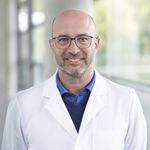Our major focus is the isolation, characterization and optimization of novel inhibitors of HIV-1 and other viral pathogens. In cooperation with Prof. Wolf-Georg Forssmann (Hannover) we have screened complex peptide-protein libraries from natural sources, such as hemofiltrate, semen, spleen, saliva and breast milk, for natural compounds affecting HIV-1 infection. These studies have led to the discovery of several HIV- inhibitors. One of them, VIRIP, corresponds to the C-proximal region of a1-antitrypsin and blocks HIV-1 entry by a novel mechanism, i.e. direct binding to the gp41 fusion peptide. A cooperative first Phase 1/2 clinical study has just been completed and showed that mono-therapy with an optimized VIRIP variant reduces the viral loads by about 1.3 orders of magnitude without causing severe side effects. We also used this approach to identify endogenous factors involved in sexual transmission of HIV-1 and found that fragments of the abundant semen marker prostatic acidic phosphatase (PAP) form amyloid fibrils, termed Semen-derived Enhancer of Virus Infection (SEVI), that capture HIV virions and enhance their infectious virus titer by several orders of magnitude. We also showed that semen itself boosts HIV-1 infection. Thus, SEVI may play an important role in sexual transmission of HIV and represents a new target for its prevention. In our ongoing studies we identified, among others, novel inhibitors and enhancers of HIV in breast milk, identified a, as-yet unknown, CXCR4 antagonist that blocks X4-tropic HIV-1 strains and obtained evidence that human blood contains several compounds capable of reactivating latent HIV-1 provirusses.
Figure 1
SEVI binds to HIV-1 virions and mediates their attachment to target cells. Cells are depicted in blue, SEVI fibrils in white and virions in red. Almost all viral particles are associated with fibrils. Kindly provided by Dr. Walther Mothes (New Haven, USA).
